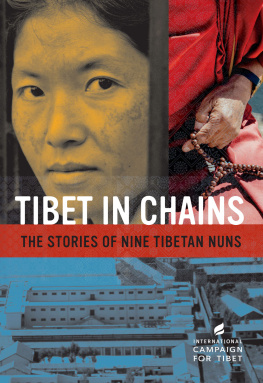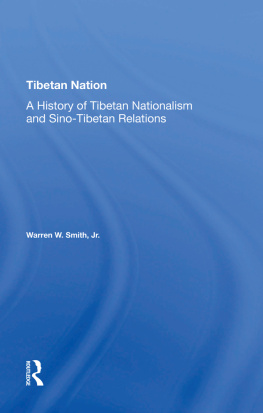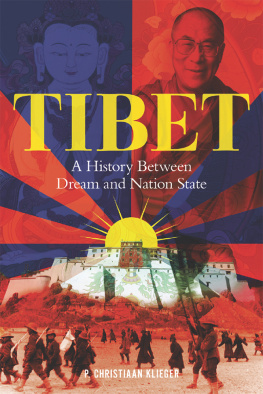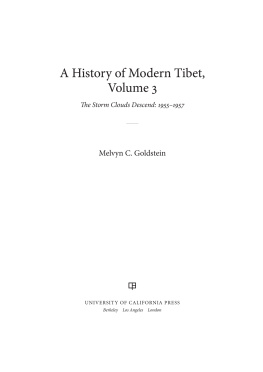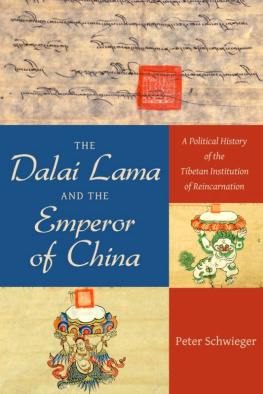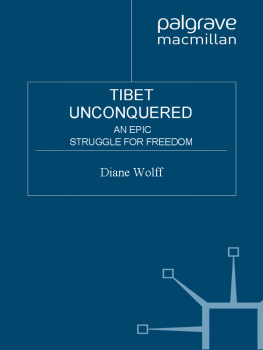Acknowledgements
The germination of this book began in the early 1970s when I was editing the Tibetan Review in which most issues unavoidably centred around the question of SinoTibetan relations, present and past. But it has taken me a long time to give it its present shape and form, a long process as a result of which I owe a debt to several kind individuals.
A suggestion to write for the Durham East Asian Series came from Professor K. L. Pratt in 1992, then the head of the Department of East Asian Studies, University of Durham. Ever since that time Professor Pratt has been patient but quite persistent in his gentle encouragement and level-headed guidance. His successor as Series Editor and Director, Centre for Contemporary Chinese Studies at Durham University, Dr Michael Dillon has proved to be equally helpful. He critically read and commented on the typescript as a specialist in Chinese history. I am grateful to both.
This book represents a line of thinking on ChinaTibet relations that has been encouraged and facilitated by the academic atmosphere at the Jawaharlal Nehru University (JNU), where there are no intellectual hegemonies but only contending theories. I am grateful to its present and past Vice-Chancellors, Professors Asis Datta and P. N. Srivastava both of whom have shown particular interest in my growth and well-being.
I am also grateful to my colleagues for their intellectual fellowship over the years. Above all, I thank my students, young men and women who in their youthful excitement and thirst for knowledge have crossed almost all the barriers that I ethnically represent. They make me feel at home. We learn a lot from each other through our open-ended and open-minded discussions, seminar after seminar. I must thank all of my student-friends at JNU.
My academic pursuit and its method have been largely dictated by relative poverty and an independent spirit with which I have undertaken my studies. Since scholarship with no strings attached is rather difficult to get in these excessively political and commercial days, I have learned, from early on, to rely on my inner resources and those which happened to be within the reach of my small local universe. This means, for instance, as I did not have funds for necessary fieldtrips, desirable for my research, I spent the summer months from 1994 to 1999 at the Library of Tibetan Works and Archives, Dharmasala (India), partly to continue my research there and partly to run away from Delhis summer heat.
While access to original materials was denied to me without sanction from higher authority (even though several scholars before and during my research, were granted this privilege), men on the floor were always helpful with the materials within their jurisdiction. In this respect I must thank Lobsang Shastri and Pema Yeshi at the Library of Tibetan Works and Archives for giving me full access to published materials.
One of my nagging regrets still remains: I have not been able to help my poor relatives in India, as it is a customary obligation of an educated man towards his unlettered kin in our community. They never cease to wonder why someone with his educational qualifications and international publications, has not joined the refugee power elite who, being enriched and empowered by their host government and certain Western countries (like the USA and Germany) have done so well for themselves and their kin. To such innocent souls I offer my apologies and sincere gratitude for their love and affection which keeps me going. They are: brother Abu and his wife Tseten and their adopted daughter Tenzin Pema; sister Dawa Bhuti and her sons, Kelsang and Dorje; brother Kesang Tenzing and his wife Chungla and their wonderful children, Jigme Dorje, Tenzin Zompa and Sonam Gyatso; my late sister Dolkars children, Choki Gope, Lobsang Thargyal and Tenzing Chomphel. And if I make some money out of this book, I hope to help some of the poorest of the poor relatives like Wanchuck in Ravangla (Sikkim), Penchung-la in Puruwala (Himachal Pradesh) and Lhakpa in Bylakuppe (Karnataka).
This book has been in the making for a long time (writing on and off since the early 1990s), and in its meandering course I have benefited from interactions and discussions with a number of individuals: John Billington, Mira Sinha Bhattacharjea, Kalzang Diki Bhutia, Kesang Tenzing Bhutia, David D. Buck, Jill Buxton, S. K. Das, G. P. Deshpande, Lowell Dittmer, Karl Heinz Ever-ding, Tara Lynne Hopkins, Huang I-shu, Ganganath Jha, Chalmers A. Johnson, Ashild Kolas, Judith Kendra, Zhang Li, V. S. Mani, Surjit Mansingh, P. L. Mehra, Marleane Mitchell, Priyadarsi Mukherji, Avijit Pathak, M. V. S. V. Prasad, Krishna Raj, Senthil Ram, Mohammad Sadiq, Robert A. Scalapino, Lobsang Shambala, the late Paul Seabury, Tsering and Lhamo Shakya, M. L. Sondhi, Tsering Topgyal, John Bryan Starr, Willy Wo-Lap Lam, and, above all, Dick Wilson whose level-headed writings on China have been a source of inspiration.
directly reveal the authoritative works and original sources researched. In particular I am indebted to Zehiruddin Ahmad, Christopher I. Beckwith, Jiun Yih Chang, Luciano Petech, Tieh-Tseng Li, Hugh Richardson, W. D. Shakabpa, Elliot Sperling and others.
Some of my fellow Tibetologists and others might find my resort to a social science interpretation and explanation of the major issues in the history of SinoTibetan relations somewhat irritating. To me social science is neither an intellectual indulgence for ego-tripping (or self-aggrandizement) nor an intellectual fashion to bandwagon. I find it the best known method of studying and analysing systematically problems of a general nature, of which I have had many experiences since childhood. If my formative life experiences and family background have been more favourable than they actually were, I would probably have preferred to write on art history (thangka).
This work is, in an operational sense, a result of private organic farming cultivated over a long period of time. Nevertheless, the following libraries and their staff have been very valuable and helpful: Jawaharlal Nehru University Library, Library of Tibetan Works and Archives, Durham University Library and School of Oriental and African Studies Library.


